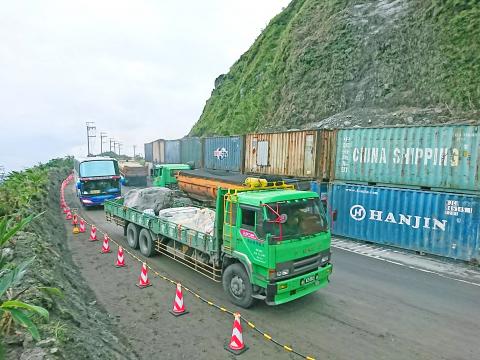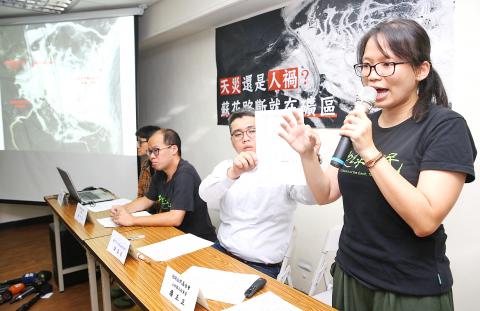A landslide on Suhua Highway in Yilan County earlier this week might have been triggered by mining activity in the old mines near the highway, environmentalists told at a news conference in Taipei yesterday, urging the government to investigate the incident.
The highway’s Jiugongli (九宮里) section near the 112.6km mark was closed from Sunday to Tuesday after a landslide fell down from 185m, blocking the road.
There were no casualties, but many Taipei residents who had traveled to Hualien for the Dragon Boat Festival holiday could not return home before work resumed on Wednesday.

Photo copied by Chiang Chih-hsiung, Taipei Times
President Tsai Ing-wen (蔡英文) on Thursday in a Facebook post said that the highway was closed because of a natural disaster.
She lauded the efforts of the response personnel, who arranged alternative transportation for the people affected.
Citizen of the Earth Taiwan consultant Tsai Chung-yueh (蔡中岳) rejected claims that the landslide happened naturally, saying there was a combination of causes behind it.

Photo: CNA
The government is used to ignoring slope exploitation as a possible cause of landslides, he said.
There are four old marble mines near the Jiugongli section — Tai Shih (台石) mine, Wu Yan (烏岩) No. 2 mine, Pei Hua (北華) mine and Hainan Corp’s (海南實業) Wu Yan No. 1 mine — the organization said.
“Looking at aerial photographs of the landslide you can see the slope is barely covered with grass,” he said, adding that the exploited lands were not duly restored.
“The authorities should probe the causes of the landslide. If it had nothing to do with the mines, they should still provide a better explanation for the cause,” he said.
Concerned with what the group said was the government’s loose management of mines, Citizen of the Earth Taiwan researcher Pan Cheng-cheng (潘正正) demanded that the outdated Mining Act (礦業法) be revised.
“The legislature’s Economics Committee promised to re-examine the act at the onset of this session. However, the Democratic Progressive Party caucus has been pushing their priority bills and have paid little attention to the act,” Pan said.
Article 27 of the act stipulates that land within 150m of national and provincial highways should not be opened up to mining without the permission of the authorities or property owners, she said.
The Ministry of Economic Affairs’ Department of Mines had asked miners to sign documents promising not to exploit lands within 150m of highways, but had failed to enforce the regulations, Pan said.
The organization demanded that the authorities investigate the landslide’s cause in depth and disclose the location of all mines along the Suhua Highway.
A strategic environmental assessment of the mines should be conducted as well, Pan said.
The department issued a statement saying that an examination of the area where the landslide occurred revealed that heavy rain was the cause.
The mines, one active and three closed, are at some distance from where the landslide occurred, the department said.
Directorate-General of Highways Section Chief Nanao Chen Wen-chang (陳文昌) said further investigation is needed.
“We have invited experts and academics to look into the issue and we will publish a report later,” Chen said yesterday by telephone.
The Jiugongli section of the highway has been cleared of debris, but clean-up efforts in the surrounding area will continue for several more days, he said, adding that heavy rains might cause delays.

Taiwan is stepping up plans to create self-sufficient supply chains for combat drones and increase foreign orders from the US to counter China’s numerical superiority, a defense official said on Saturday. Commenting on condition of anonymity, the official said the nation’s armed forces are in agreement with US Admiral Samuel Paparo’s assessment that Taiwan’s military must be prepared to turn the nation’s waters into a “hellscape” for the Chinese People’s Liberation Army (PLA). Paparo, the commander of the US Indo-Pacific Command, reiterated the concept during a Congressional hearing in Washington on Wednesday. He first coined the term in a security conference last

Prosecutors today declined to say who was questioned regarding alleged forgery on petitions to recall Democratic Progressive Party (DPP) legislators, after Chinese-language media earlier reported that members of the Chinese Nationalist Party (KMT) Youth League were brought in for questioning. The Ministry of Justice Investigation Bureau confirmed that two people had been questioned, but did not disclose any further information about the ongoing investigation. KMT Youth League members Lee Hsiao-liang (李孝亮) and Liu Szu-yin (劉思吟) — who are leading the effort to recall DPP caucus chief executive Rosalia Wu (吳思瑤) and Legislator Wu Pei-yi (吳沛憶) — both posted on Facebook saying: “I

The Ministry of Economic Affairs has fined Taobao NT$1.2 million (US$36,912) for advertisements that exceed its approved business scope, requiring the Chinese e-commerce platform to make corrections in the first half of this year or its license may be revoked. Lawmakers have called for stricter enforcement of Chinese e-commerce platforms and measures to prevent China from laundering its goods through Taiwan in response to US President Donald Trump’s heavy tariffs on China. The Legislative Yuan’s Finance Committee met today to discuss policies to prevent China from dumping goods in Taiwan, inviting government agencies to report. Democratic Progressive Party Legislator Kuo Kuo-wen (郭國文) said

The Ministry of Economic Affairs has fined Taobao NT$1.2 million (US$36,900) for advertisements that exceeded its approved business scope and ordered the Chinese e-commerce platform to make corrections in the first half of this year or its license would be revoked. Lawmakers have called for stricter supervision of Chinese e-commerce platforms and more stringent measures to prevent China from laundering its goods through Taiwan as US President Donald Trump’s administration cracks down on origin laundering. The legislature’s Finance Committee yesterday met to discuss policies to prevent China from dumping goods in Taiwan, inviting government agencies to report on the matter. Democratic Progressive Party